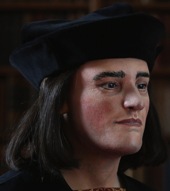Historical Novel Society of Australasia Conference in Sydney – A Review
The weekend of March 20-22 proved a rewarding one for writers of historical fiction, whether their work was already established or still in embryo. It took delegates to the Historical Novel Society of Australasia Conference far beyond the bodice-ripper image to valuable considerations of topics and treatments and through historical ages in war and peace from the Normans to Anzacs.
The opening on Friday evening at the State Library of New South Wales combined cocktails and conversation with reunions with old friends and new acquaintances to meet. The welcoming address was followed by the launch of Unholy Murder, the third book in Felicity Pulman’s Janna Chronicles set during the civil war between Stephen and Matilda. NSW Ricardians who attended the 2010 conference at Cammeray will remember Felicity’s skill at extensive research when she was a guest speaker – and later became a Friend of the Branch.
The evening concluded with a fascinating round table debate on “What can historical novelists and historians learn from each other?”
On Saturday and Sunday the venue was Balmain Town Hall and after a welcome from HNSA Patron Kate Forsyth, Colin Falconer (When We Were Gods, Silk Road, Stigmata) spoke succinctly and entertainingly on The Anzac tradition of inspiration: imagining the past, claiming the present. This was followed by Peter Corris and Sulari Gentil recounting how their careers have progressed, their inspirations and how they tackle their subjects (and for those of you who might consider Corris’s indefatigable PI Cliff Hardy as not anyone of historical interest, just reflect that he has been around for 40 years and his world has changed dramatically).
A varied and delicious morning tea break led to three historical novelists revealing how they select the age about which they are writing and the research needed to bring characters, plot and period to credible life. The novelists were Juliet Marillier, known for her splendid historical fantasies, New Zealander Craig Cliff (The Mannequin Makers) and Isolde Martyn, former chair of the NSW Branch of the Richard III Society and author of award winning novels including The Lady and the Unicorn, and recently Mistress to the Crown and The Golden Widows.
Further discussion followed until lunch time including a discussion as to whether historical novelists can capture young readers at a time when the films such as Hunger Games and vampires dominate. In the afternoon the tales of World Wars 1 and 2 were highlighted, showing characters conquering or succumbing to the dramas around them. This was followed by readings of one-page submissions and how they could attract – or not – a publisher’s attention.
Dinner was held at the nearby Royal Oak Hotel, where the occupants of all the tables seemed to have much to talk about, encouraged by the good food and wine and company that made a memorable evening.
Sunday’s opening feature was fascination: two authors describing how they changed their already successful careers to become historical novelists. Toni Jordan was a molecular biologist before turning to write great contemporary fiction and then changing again to historical fiction. Posie Graeme-Evans was an exceptionally successful television director, producer and executive (McLeods Daughters and more) before taking the leap into writing about the past, the people and time slips that link them.
The following discussion was one to intrigue all Ricardians, What is it about the Tudors? And why are publishers so fascinated by them and opt for these times above other periods? Tudorphilia prevails and the panel for this had much to say. When asked about their favourite Tudor personality, the majority opted for Elizabeth with Anne Boleyn a close second. NSW Ricardian and frequent contributor to our website, novelist Barbara Gaskell Denvil, pointed out that the Tudors all came with a tag attached such as “Six Wives”, “Bloody Mary”, “Virgin Queen”. (Later she and I lamented that no-one put in a word for our favourite Tudor Anne of Cleves, surely as much a victim of Tudor propaganda as King Richard III.)
(I would have loved to have heard the other talks, but had to leave early to catch the coach for my five-hour trip home.)
The rest of the discussions included novels of fantasy, mystery and time-slips; the possibilities and perils of independent publishing; and agents and publishing representatives telling what they look for. I am told that the day ended – as all occasions should – with In Bed with History: sexy, saucy and sizzling bedroom scenes read with glee and gusto by Colin Falconer and Kate Forsyth.
It was a rewarding and interesting time, well organised with worthwhile speakers who spoke with knowledge and humour. It was the first conference that the Historical Novels Society of Australasia had held. I doubt it will be the last.
Tags: Books, Historical Novels


Leave a reply